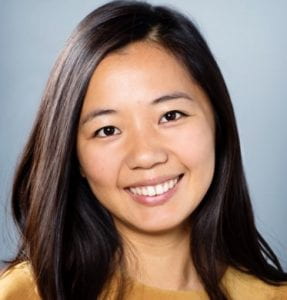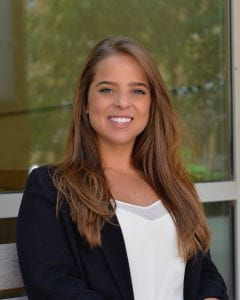Language Justice Speaker Series
Working with multilingual community members in healthcare contexts
Presenter: Dr. Laura Gonzales
Slides
Contact Laura at gonnzalesl@ufl.edu
About the presentation
In this presentation, Gonzales will share examples from her collaborations with Indigenous language interpreters and translators and other minoritized language speakers to present tips and strategies for collaborating with multilingual community members in healthcare contexts. While healthcare providers are increasingly working with language lines and other translation services to provide language access, it is important to expand training opportunities for healthcare practitioners to effectively work with multilingual communities. A language line or written translation will not be effective if healthcare practitioners are not properly trained to communicate with multilingual community members through these services. This presentation will include new frameworks and orientations for engaging with multilingual community members in healthcare contexts.
About Laura
Dr. Laura Gonzales is an Assistant Professor of Digital Writing and Cultural Rhetorics in the Department of English at the University of Florida. Her research focuses on the intersections of language diversity, community engagement, and technology design. Dr. Gonzales is the author of Sites of Translation: What Multilinguals Can Teach Us About Digital Writing and Rhetoric (University of Michigan Press, 2018), which won the 2020 CCCC Advancement of Knowledge Award and the 2016 Digital Rhetoric Collaborative Book Prize. Her second monograph, Designing Multilingual Experiences in Technical Communication, is forthcoming by Utah State University Press. Dr. Gonzales is the Vice President of the Association of Teachers of Technical Writing (ATTW) and the editor of Reflections: A Journal of Community-Engaged Writing and Rhetoric.
Starting a Language Access Program in Three Steps
April 29th from 12:00-1:00
Format: 30 minute presentation with Q and A
Presenter: Peggy Liao

Slides
Contact Peggy at yrsuing@gmail.com
About the presentation
The success of an agency’s mission depends on accurate communication with members of the public, regardless of their level of English proficiency, according to the U.S. Department of Justice. Language access should be integrated in service provision and program implementation. Language access supports accurate communication and helps provide community members meaningful access to resources. No matter where you are in your journey, this talk will provide you with a framework and resources to advance your language access program. Join us in our discussion with Peggy where she will share her experience and best practices in establishing a successful language access program. She will cover both shifting people’s mindset toward offering language services and creating infrastructure to support your agency’s communication with immigrant community members.
About Peggy
Peggy Liao advocates for and believes that everyone should have access to public information and services regardless of the language they speak. She was born and raised in Taiwan and moved to the U.S. in 2014. She holds a B.A. in business administration and received her master’s degree in social design from Maryland Institute College of Art. She has worked at Asian Counseling and Referral Service, a non-profit, to promote civic engagement and at C+C, a communication agency focusing on multicultural communication, transcreation and social marketing. Peggy now works within the City of Seattle’s Office of Immigrant and Refugee Affairs and manages the city-wide Language Access Program. She is committed to supporting every city department in its provision of linguistically-appropriate and culturally-relevant information for all Seattle residents.
Presentation: The Cross-Cultural Impact of Accessible Iconography within Digital Spaces
View Slides
Tools for Creating Accessible Iconography
- Web AIM Contrast Checker
- Colour Contrast Analyser
- Color Safe
- Adobe Color
- Accessible Color Palette Builder
- Flaticon
- Icons8
- Iconfinder
Presenter: Carolina Cará

About the presentation:
Language access is about more than words. The images we use in digital spaces have a big impact on the usability of a web page for people from a variety of cultural and linguistic backgrounds. This talk will outline the importance of imagery, specifically iconography, and how to choose and design icons for cultural relevance. We will discuss the impact that iconography has on creating relatable and inclusive experiences by outlining how the process of creating icons should include accessibility from the very beginning. This talk will include tips, techniques, and resources for creating and using iconography in digital spaces.
About Carolina:
Carolina has a strong background in the graphic arts and specializes in web accessibility. She received her Bachelor of Science (2017) and Master of Science (2020) degrees in Visualization from Texas A&M University. Her previous experiences include being an Accessibility Consultant for the University of Boulder, a Web Accessibility Specialist for Owens Corning, a Digital Accessibility Engineer for Optum, and has just recently begun her work as an Accessibility Architect for a telecommunications company. She is responsible for assessing websites and digital resources using assistive technologies and automated applications, including manual testing procedures. Carolina uses her passion to advocate for welcoming and inclusive digital experiences. In her free time, Carolina enjoys the outdoors, art, and traveling.
Contact Carolina via email at c.carabr@gmail.com or Linkedin
Ponencia: Logros y retos en los servicios de interpretación y traducción en lenguas indígenas en los servicios públicos
Presentation: Accomplishments and Challenges in the Translation and Interpretation of Indigenous Languages in Public Services
Presenters:

Gaby León Ortiz is originally from the community of Santa María Yucunicoco, Juxtlahuaca, where she has worked as a promoter of Indigenous women’s rights and linguistic rights. She graduated with her bachelor’s degree in Law and Social Sciences from the Universidad Autónoma Benito Juárez de Oaxaca. Gaby is co-coordinator of translation and interpretation for the Centro Profesional Indígena de Asesoría, Defensa, y Traducción (CEPIADET). She is a Mixteco interpreter and member of the National Roster of Indigenous Language Interpreters and Translators (Padrón Nacional de Intérpretes y Traductores en Lenguas Indígenas (PANITLI)). Gabi is an ambassador for Linguistic Rights at CEPIADET, and she has participated in workshops, courses, and certificate programs, both local and national, focused on human rights, specifically related to the rights of Indigenous communities, interpretation and translation, among others. She has facilitated workshops and presented on topics related to cultural diversity and language rights.
Gaby León Ortiz, es originaria de la comunidad de Santa María Yucunicoco, Juxtlahuaca, Oaxaca en donde ha participado como promotora de derechos de las mujeres y derechos lingüísticos. Egresada de la licenciatura en Derecho y Ciencias Sociales de la Universidad Autónoma Benito Juárez de Oaxaca, Gaby es co-coordinadora de interpretación y traducción en el Centro Profesional Indígena de Asesoría, Defensa y Traducción (CEPIADET A.C.). También es intérprete de la Lengua Mixteca e integrante del Padrón Nacional de Intérpretes y
Traductores en Lenguas Indígenas (PANITLI), embajadora de los Derechos Lingüísticos del Centro Profesional Indígena de Asesoría, Defensa y Traducción Asociación Civil (CEPIADET A.C.), ha participado en talleres, cursos, diplomados tanto locales y nacionales enfocados en losderechos humanos, específicamente en derecho de los pueblos indígenas, interpretación y traducción, entre otros. Ha sido tallerista y ponente en temas de diversidad cultural y derechos lingüísticos.

Flavio Vásques López, who graduated with a bachelor’s in law from the Universidad Autónoma “Benito Juárez” de Oaxaca, (UABJO), is originally from the community of Miramar, Municipality of Santa María Yucuhiti, Tlaxiaco, Oaxaca. He is a speaker of Tu´un savi (Mixteco). He was also a research assistant for the project, “Indigenous Communities and Legal Reform: Strategies for Democratic Implementation,” which was sponsored by the National Endowment for Democracy. Flavio also served as a research assistant for the book, Informe sobre el estado que guardan los derechos lingüísticos de los pueblos y comunidades indígenas en el ámbito de procuración y administración de justicia en Oaxaca (A Report on the Status of Language Rights for Indigenous Communities in the Procurement and Administration of Justice in Oaxaca). He also participated in the development of an Indigenous regulatory system in the Municipality of Santiago Nuyoo, Tlaxiaco, Oaxaca, and he collaborated on the development of the Community Statute of Indigenous Normative Systems in the community Ñuun Savi of Santa María Yucuhiti. He currently works as the coordinator of Indigenous language translators and interpreters at CEPIADET.
Flavio Vasquez López, egresado de la Licenciatura en Derecho por la Universidad Autónoma “Benito Juárez” de Oaxaca, (UABJO); originario de la comunidad de Miramar, Municipio de Santa María Yucuhiti, Tlaxiaco, Oaxaca. Hablante de lengua Tu´un savi (Mixteco). Fue asistente de investigación del proyecto denominado: “Los pueblos indígenas frente a la reforma penal: estrategias para una implementación democrática”, proyecto auspiciado por National Endowment for Democracy (NED). Fungió como asistente de investigación del libro denominado “Informe sobre el estado que guardan los derechos lingüísticos de los pueblos y comunidades indígenas en el ámbito de procuración y administración de justicia en Oaxaca”. Participó también en la elaboración del sistema normativo indígena del Municipio de Santiago Nuyoo, Tlaxiaco, Oaxaca, así mismo, colaboró en la elaboración del Estatuto Comunitario de Sistema Normativos Indígenas de la comunidad Ñuun Savi de Santa María Yucuhiti y Actualmente funge como coordinador de intérpretes y traductores de lenguas Indígenas en CEPIADET.
Support provided by the Office of Community Partnerships, the School of Interdisciplinary Arts and Sciences, and the Strategic Initiative Fund at UW Tacoma.
